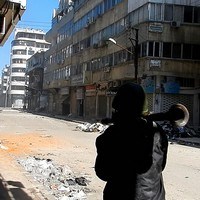The Obama administration yesterday announced that it would provide military assistance to Syrian rebels, after having concluded that the regime of Syrian President Bashar al-Assad has used chemical weapons against opposition fighters in the ongoing civil war. The move comes after months of criticism of the administration, from both left and right, for its apparent fecklessness with regard to the ongoing civil war in Syria. Washington ought to have been doing more to protect the Syrian populace from the repressions of the Baathist dictatorship, cry the liberal interventionists. The president’s "inaction" has strengthened America's foes and disheartens its allies, argue many neoconservatives.
But what if the Obama team, instead of dithering while Syria burns, has in fact been executing a cold-blooded, Machiavellian strategy, content to project the appearance of policy impotence? Consider the following points.
First, allowing the fighting to go on could create a new version of what was termed in the Bush administration the "flypaper" strategy. Sunni jihadists, particularly those who previously caused such trouble for the United States in Iraq, are being drawn to fight and die on the battlefields of Syria. In addition, the Syrian crisis allows the states of the Gulf to once again implement what Dan Byman has labeled the "bus station" strategy (.pdf); instead of cracking down on radicals at home, they can be encouraged to fight somewhere else. This approach worked well in the 1980s, when eager jihadis were dispatched to fight against the Soviets in Afghanistan—a geopolitical "twofer" that removed threats to the internal stability of U.S. allies while at the same time causing real headaches for the Soviet Union.

